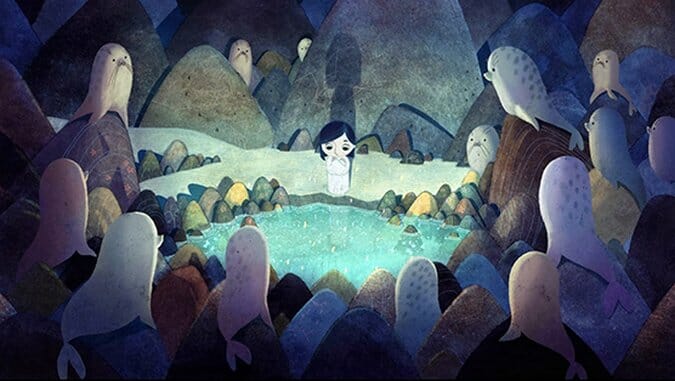Song of the Sea

Tomm Moore’s Song of the Sea might have made a better video game than a motion picture. That’s saying something, because as motion pictures go, it’s an absolutely visceral stunner: you may find yourself wishing you could interact with its characters, live in its vividly realized world, participate in its defining ancestral conflicts. In fact, among 2014’s varied animated offerings, only Studio Ghibli’s The Tale of Princess Kaguya compares to Moore’s sophomore effort for the sheer, alluring magic of its storytelling. Why GKIDS, the film’s U.S. distributor, didn’t hustle to guarantee its theatrical run in the States before the annual onslaught of critics’ groups voting is, and always shall remain, a mystery.
It’s easy to imagine how seamlessly the film could translate into a puzzle game, and easier still to trip out over how great that game might be. Alas, we must accept Song of the Sea as it is, which is a pretty good deal anyway, because it’s easily the best animated film of the year, at least for anyone who has a deep-rooted love for the textured, deceptively simple aesthetics of 2D animation. It doesn’t hurt to also possess an appreciation for national mythology; Moore saturates his film with enough references to Irish folklore to make Neil Gaiman blush.
Song of the Sea begins with a trope familiar to many children’s movies—the death of a parent—and from there transitions into a yarn about sibling resentment. As a child, Ben (David Rawles) happily lives with his father, Conor (Brendan Gleeson), and his mother, Bronagh (Lisa Hannigan), until, spurred on for no immediately obvious reason, she seemingly abandons them; on that same night, she gives birth to a daughter, Saoirse, who all these years later still hasn’t learned to speak. Ben blames Saoirse for his mother’s death, and has diligently maintained a grudge against his sister ever since that fateful, stormy eve. But then Saoirse gets her tiny hands on a shell flute Bronagh bequeathed to Ben, and each tune she plays the instrument it slowly but surely reveals a hidden, enchanted world full of fae inhabitants. Thus, adventure commences.
-

-

-

-

-

-

-

-

-

-

-

-

-

-

-

-

-

-

-

-

-

-

-

-

-

-

-

-

-

-

-

-

-

-

-

-

-

-

-

-








































